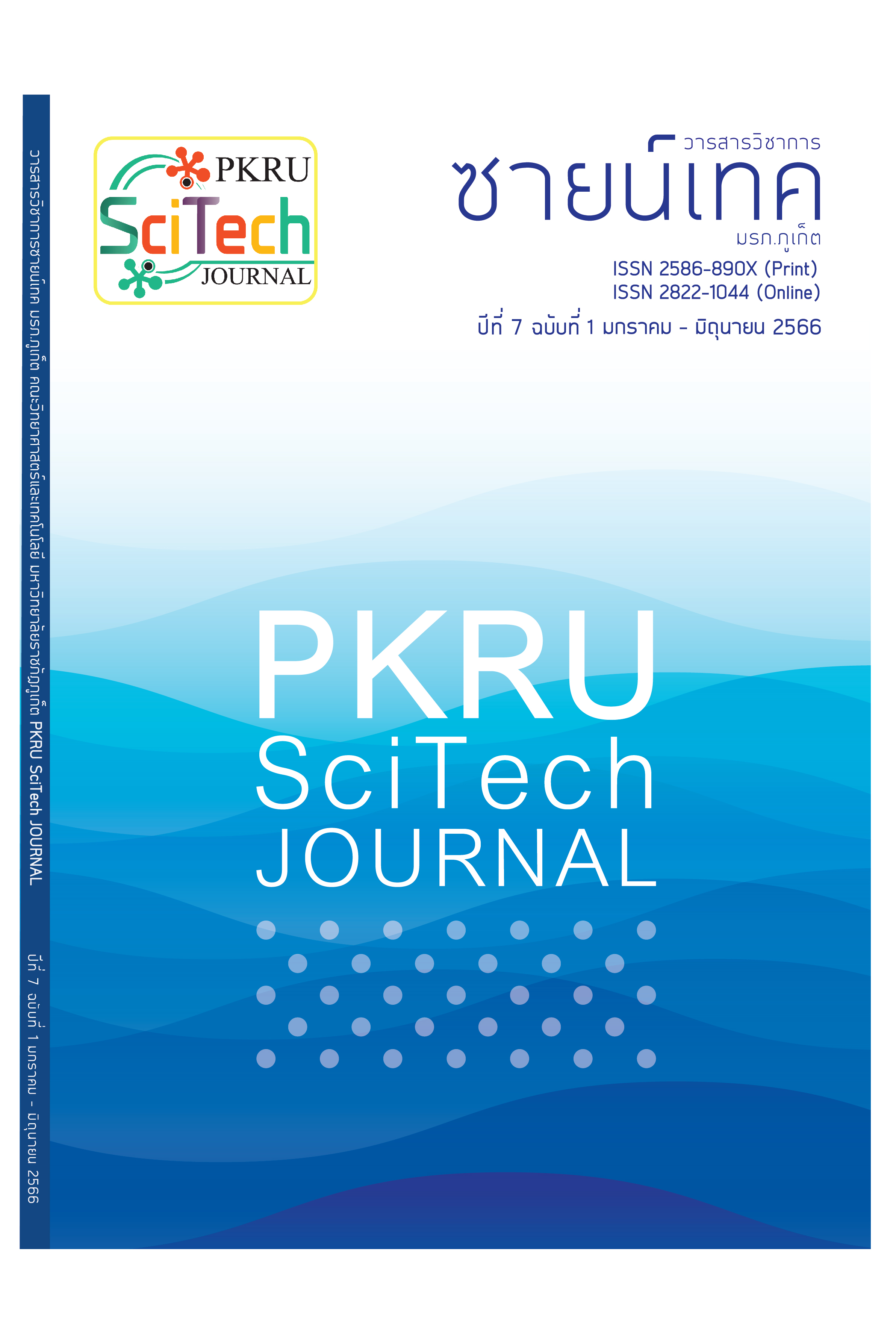The การเปรียบเทียบตัวประมาณค่าเฉลี่ยจากการประมาณค่าสูญหาย ภายใต้ความแตกต่างของรูปแบบการสูญหาย
Main Article Content
บทคัดย่อ
งานวิจัยนี้มีวัตถุประสงค์เพื่อเปรียบเทียบวิธีการประมาณค่าสูญหาย ได้แก่ วิธีของ Gira วิธีของ Singh และวิธีของ Aliyu ภายใต้รูปแบบการสูญหายของข้อมูลได้แก่ การสูญหายแบบสุ่มอย่างสมบูรณ์ การสูญหายแบบสุ่ม และการสูญหายแบบไม่สุ่ม เพื่อประมาณค่าเฉลี่ยในกรณีข้อมูลมีปัญหาการสูญหาย งานวิจัยนี้ทำการทดลองโดยใช้การจำลองข้อมูลทั้งหมด 10,000 ครั้ง กำหนดสถานการณ์ดังนี้ ขนาดตัวอย่างได้แก่ 30, 100, 400 ภายใต้ลักษณะการสูญหายของข้อมูลในรูปแบบต่าง ๆ ร้อยละข้อมูลสูญหาย ได้แก่ 5, 10, 15 เกณฑ์ที่ใช้ในการเปรียบเทียบคือ ค่าเฉลี่ยความคลาดเคลื่อนกำลังสอง และค่าร้อยละประสิทธิภาพสัมพัทธ์ จากผลการทดลองวิธีที่เหมาะสมในการประมาณค่าเฉลี่ยจากการประมาณค่าสูญหาย คือ วิธีของ Singh วิธีของ Aliyu และวิธีของ Gira ตามลำดับ
Article Details

อนุญาตภายใต้เงื่อนไข Creative Commons Attribution-NonCommercial-NoDerivatives 4.0 International License.
- เนื้อหาต้นฉบับที่ปรากฏในวารสารเป็นความรับผิดชอบของผู้เขียน ทั้งนี้ไม่รวมความผิดพลาดอันเกิดจากเทคนิคการพิมพ์
- ลิขสิทธิ์ต้นฉบับที่ได้รับการตีพิมพ์ในวารสารวิชาการ ซายน์เทค มรภ.ภูเก็ต ถือเป็นกรรมสิทธิ์ของวารสารวิชาการ ซายน์เทค มรภ.ภูเก็ต
เอกสารอ้างอิง
Gibson, N. M., & Olejnik, S. (2003). Treatment of missing data at the second level of hierarchical linear models. Educational and Psychological Measurement, 63(2), 204-238.
วราฤทธิ์ พานิชกิจโกศลกุล. (2552). การจำลองแบบมอนติคาร์โลสำหรับประมาณค่าความแปรปรวนของการแจกแจงอินเวอร์สเกาส์เซียน เมื่อข้อมูลมีค่าสูญหาย, ว.การวิจัยกาสะลองคำ, 3(1), 14-23.
Chakrabarty, R. P. (1979). Some ratio estimators. Journal of the Indian Society of Agricultural Statistics, 31(1), 49-57.
Srivenkataramana T., & Tracy D. S. (1980). An alternative to ratio method in sample survey. Annals of the Institute of Statistical Mathematics, 32, 111-120.
Singh, V. K., & Shukla, D. (1987). One parameter family of factor-type ratio estimation. Metron, 45, 273-283.
Bahl, S., & Tuteja, R. K. (1991). Ratio and product type exponential estimator. Information and Optimization Sciences, 12(1), 159-163.
Singh, H. P., & Tailor, R. (2003). Use of known correlation coefficient in estimating the finite population means. Statistics in Transition, 6(4), 555-560.
Kadilar, C., & Cingi, H. (2006a). An improvement in estimating the population mean by using the correlation coefficient. Hacettepe Journal of Mathematics and Statistics, 35(1), 103-109.
Kadilar, C., & Cingi, H. (2006b). Improvement in estimating the population mean in simple random sampling. Applied Mathematics Letters, 19, 75-79.
Upadhyaya, L. N., Singh, H. P., Chatterjee, S., & Yadav, R. (2011). Improved ratio and product exponential type estimators. Journal of Statistical Theory and Practice, 5(2), 285-302.
Yadav, S. K., & Kadilar, C. (2013). Efficient family of exponential estimators for the population mean. Hacettepe Journal of Mathematics and Statistics, 42(6), 671-677.
Khan, S. A., Ali, H., Manzoor, S., & Alamgir, K. (2015). A class of transformed efficient ratio estimators of finite population mean. Pakistan Journal of Statistics, 31(4), 353-362.
Kadilar, G. O. (2016). A new exponential type estimator for the population mean in simple random sampling. Journal of Modern Applied Statistical Methods, 15(2), 207-214.
Gira, A. A. (2015). Estimation of population mean with a new imputation method. Applied Mathematical Sciences, 9(34), 1663-1672.
Singh, R., Verma, H. K., & Sharma, P. (2016). Estimation of population mean using exponential type imputation technique for missing observations. Journal of Modern Applied Statistical Methods, 15(1), 358-372.
Aliyu, Y. H., Adewara, A. A., Audu, A., Abidoye, O. A., Sulaiman, I., & Aliyu, M. B. (2022). Modified compromized type method of imputation for estimating population mean. Journal of Scientific Research, 66(1), 404-410.
Little, R., & Rubin, D. (2002). Statistical analysis with missing data. New York: Wiley.
Vongprasert, J. (2021). Missing Data Imputation Based on Accuracy of Binary Classification. The Journal of King Mongkut's University of Technology North Bangkok, 31(1), 90-98.
Chodjuntug, K., & Lawson, N. (2020). A chain ratio exponential-type compromised imputation for mean estimation: case study on ozone pollution in Saraburi, Thailand. Journal of Probability and Statistics, 1, 1-6.
Chodjuntug, K., & Lawson, N. (2022). Imputation for estimating the population mean in the presence of nonresponse, with application to fine particle density in Bangkok. Mathematical Population Studies, [Online], available from : https://doi.org/10.1080/08898480.2021.1997466


